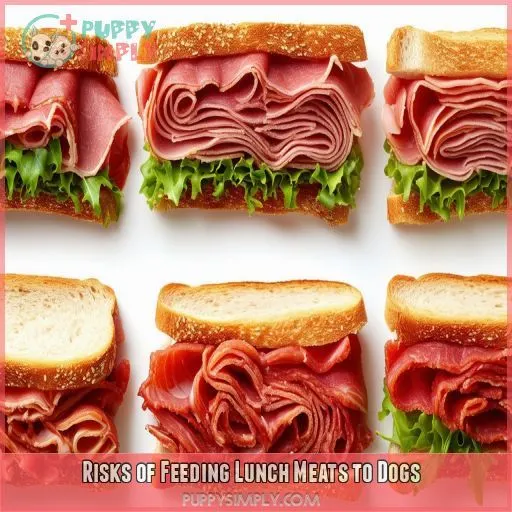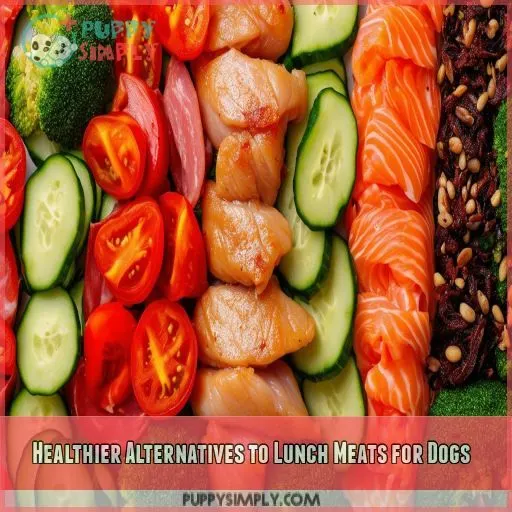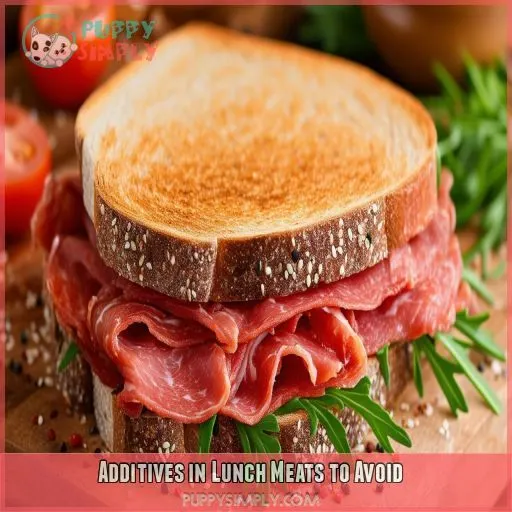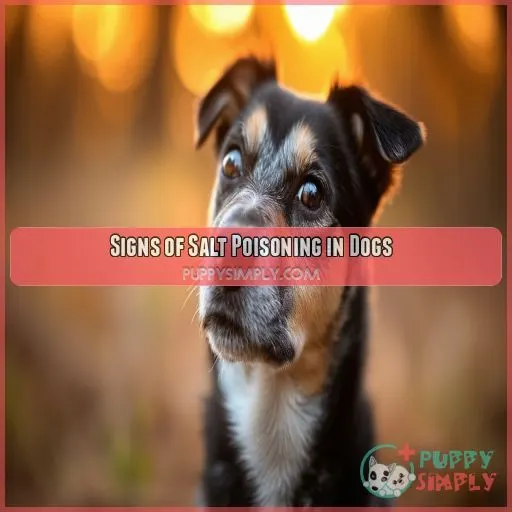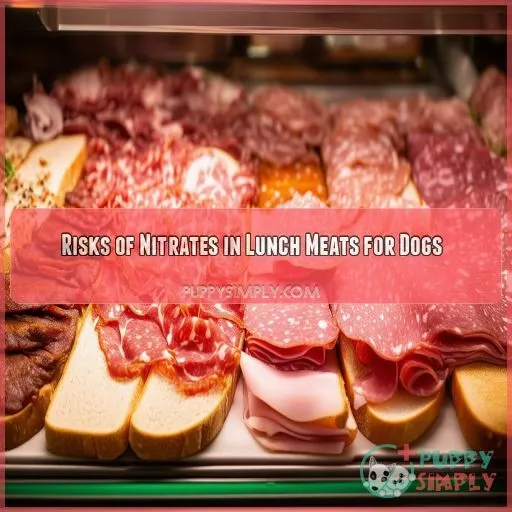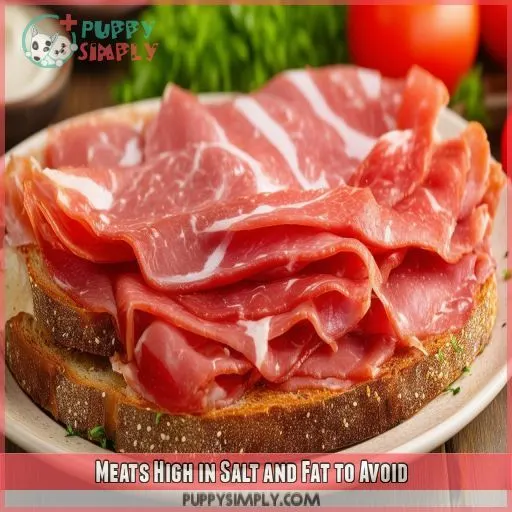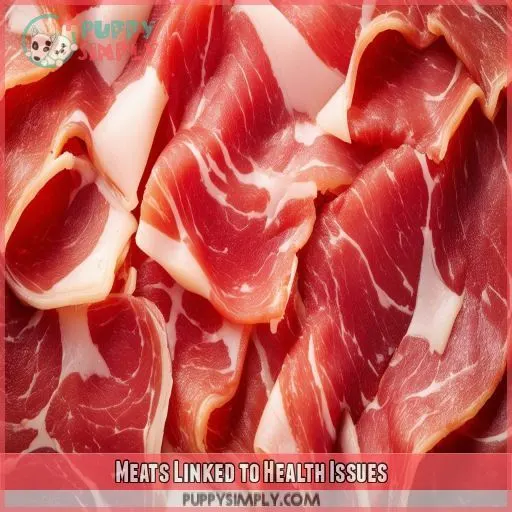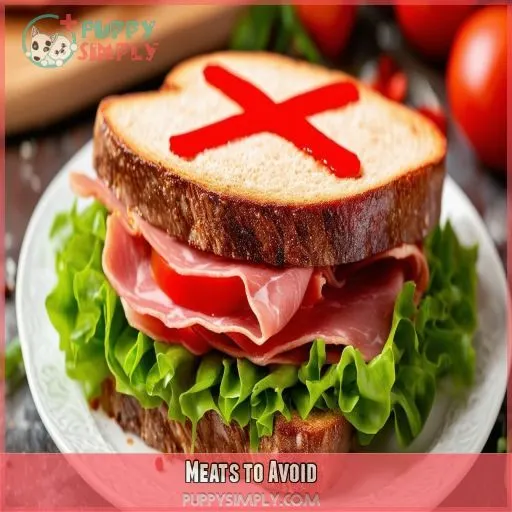This site is supported by our readers. We may earn a commission, at no cost to you, if you purchase through links.
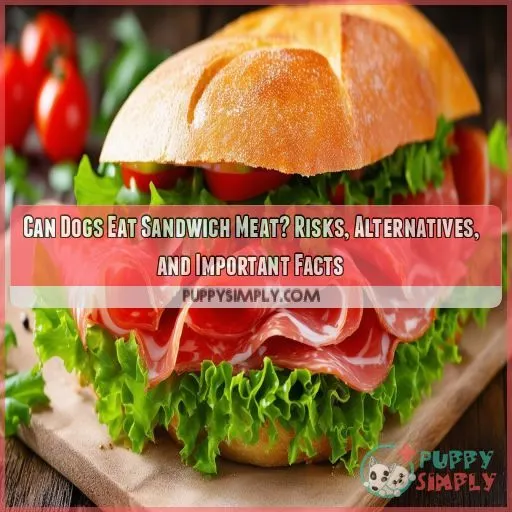 Imagine giving your dog a little bite of heaven, but is sandwich meat safe for dogs?
Imagine giving your dog a little bite of heaven, but is sandwich meat safe for dogs?
As much as your furry friend begs for a bite, lunch meats are pretty dangerous. Grossly salted, seasoned with harmful ingredients, full of unhealthy fats—these pose serious health consequences if given regularly.
In this article, find out the risks, know their healthier alternatives, and mark some essential facts that ensure your dog’s diet will remain safe and wholesome enough to satisfy his or her needs for well-being and safety
Table Of Contents
- Key Takeaways
- Can Dogs Eat Sandwich Meat?
- Risks of Feeding Lunch Meats to Dogs
- Healthier Alternatives to Lunch Meats for Dogs
- Additives in Lunch Meats to Avoid
- Signs of Salt Poisoning in Dogs
- Risks of Nitrates in Lunch Meats for Dogs
- Meats High in Salt and Fat to Avoid
- Meats With Bones
- Meats to Proceed With Caution
- Meats Linked to Health Issues
- Meats to Avoid
- Frequently Asked Questions (FAQs)
- What deli meats can dogs eat?
- Can dogs eat sliced turkey?
- Can dogs eat ham and turkey?
- What meat should a dog avoid?
- Can a dog eat meat if he eats a sandwich?
- What meat should I never feed my dog if they have dementia?
- Can dogs eat lunch meat?
- Can dogs eat a turkey sandwich?
- Can dogs eat turkey sandwich meat?
- Are there safe ways to prepare sandwich meat for dogs?
- How often can dogs have sandwich meat?
- Can sandwich meat cause upset stomachs in dogs?
- Can dogs eat sandwich meat with whole grain bread?
- Conclusion
Key Takeaways
- Don’t be a salty dog! Keep Fido away from sandwich meat, as it’s a recipe for salt poisoning.
- Some sandwich meats are like a ticking time bomb for your pup. Seasonings like garlic and onion powder can be toxic, so steer clear!
- Fatty sandwich meats are a no-go zone for your furry friend. They can lead to pancreatitis, a painful condition that can be life-threatening.
- If you’re craving a meaty treat for your dog, opt for unprocessed, cooked meats instead. Remember, a happy and healthy pup is a treat in itself!
Can Dogs Eat Sandwich Meat?
While it might seem like a tasty treat, feeding your dog sandwich meat is risky.
These meats are loaded with salt, which can lead to salt poisoning, and often contain toxic seasonings like garlic and onion powder.
They’re also high in fat, causing vomiting and diarrhea, and can include harmful additives such as carrageenan and nitrates, linked to cancer and other health issues.
Healthier options include unprocessed, thoroughly cooked meats or dog-specific treats.
Stick to plain, cooked lean meats to keep your furry friend safe.
Want to know more about safe and delicious alternatives for your dog’s diet?
Risks of Feeding Lunch Meats to Dogs
Feeding lunch meats to your dog can be risky because they’re often high in salt, which can lead to salt poisoning, and may contain toxic seasonings like garlic and onion powder. Additionally, their high fat content can cause vomiting and diarrhea, and some brands include carrageenan, a potentially harmful additive
High in Salt Content, Leading to Potential Salt Poisoning
Feeding your dog sandwich meat can result in salt toxicity. The high amount of salt within these meats comes with the dangers of dehydration, kidney damage, and electrolyte imbalance. Fluid retention may occur, and your dog may be subject to various health issues. Stick to dog food to ensure proper nutrition and avoid excess salt for good health.
Contain Toxic Seasonings Like Garlic and Onion Powder
Feeding sandwich meat to your dog isn’t the best idea, especially since many contain toxic seasonings like onion and garlic powder. These can pose serious risks to your dog’s health.
- Onion powder can lead to red blood cell damage, causing anemia.
- Garlic powder may result in gastrointestinal upset.
- Seasonings overall are harmful and disrupt a balanced diet
High in Fat, Which Can Cause Vomiting and Diarrhea
Lunch meats are often high in fat, which can wreak havoc on your dog’s health. Excess fat can lead to obesity, fatty liver, and pancreatitis, causing severe vomiting and diarrhea. Additionally, fatty foods can trigger allergies and digestive upset, further compromising your pet’s well-being. Prioritize your dog’s health by avoiding high-fat lunch meats and opting for healthier alternatives
May Contain Carrageenan, a Potentially Harmful Additive
Carrageenan is a common additive in lunch meats that poses health concerns for dogs. This ingredient can lead to inflammation and digestive issues, contributing to carrageenan toxicity. Since there’s ongoing debate about its safety in pet foods, opt for alternatives without carrageenan. Check dog food ingredients, go for recommended dog food brands, and explore dog food recipes for healthier options
Healthier Alternatives to Lunch Meats for Dogs
Instead of sandwich meat, consider feeding your dog unprocessed, thoroughly cooked meats or canned dog food. Dog-specific jerky treats are also a great option for a healthier alternative
Unprocessed, Thoroughly Cooked Meats
Opting for unprocessed, thoroughly cooked meats provides numerous benefits for your dog’s health. This choice prevents salt poisoning and avoids harmful nitrates. Focus on healthy cooking methods, avoiding added seasonings. Always practice portion control and consider consulting your vet for personalized advice. Including such alternatives supports a balanced diet, ensuring your dog enjoys safer, healthier foods
Canned Dog Food
Canned dog food can be a healthier alternative to lunch meats for your pup. Look for high-quality brands that use whole, natural ingredients and avoid additives. Canned food can provide complete and balanced nutrition, plus it’s convenient and easy to serve. For training or special occasions, you can even use canned food as a reward
Dog-specific Jerky Treats
Dog-specific jerky treats are excellent alternatives to lunch meats. These treats minimize the risks associated with processed meats, offering a healthier option for your pet. They’re great for dogs with allergies, provide chewing satisfaction, and act as effective training incentives. Plus, portion control is easier, ensuring your dog gets the right amount without harmful additives
Additives in Lunch Meats to Avoid
As far as dog sandwich meats are concerned, always watch out for some additives such as salt, carrageenan, nitrates, preservatives, and colorings. These ingredients are capable of exposing health to risks like salt poisoning, stomach problems, and increasing the risks of cancer.
Salt
Salt intake in dogs should be monitored closely. High sodium levels in lunch meats can lead to hypertension, dehydration, and electrolyte imbalance. These risks are heightened since dogs’ bodies are less adept at processing salt compared to humans. So, it’s best to avoid giving your dog sandwich meats loaded with salt for their safety
Carrageenan
Carrageenan in the lunch meats can be quite harmful to your dog. It’s an additive and might pose gastrointestinal problems, but more importantly, it’s one of the causes of chronic inflammation that will degrade your pet’s health over time.
Look for alternatives to carrageenan, such as non-processed or at least minimally processed meats, to prevent these side effects. Knowing about carrageenan toxicity will help you make the best choices for your dog’s diet and general health
Nitrates
Nitrates found in lunch meats can pose serious risks for your canine companion. These preservatives have been linked to cancer in humans and may also affect the thyroid gland and red blood cells. Unfortunately, there are no established guidelines for their use in dog food, so it’s best to avoid them altogether. The historical evidence of nitrate toxicity in dogs and cats is concerning, so steer clear of this risky additive.
- Nitrates in lunch meats have been linked to cancer in humans.
- Nitrates may disrupt the thyroid gland and red blood cells.
- There are no clear guidelines for the use of nitrates in dog food.
- Nitrate toxicity has been documented in dogs and cats in the past
Preservatives
Preservatives can be toxic for dogs and may even include chemical additives. Long-term ingestion could result in organ damage and a shortened life span from preservatives found in lunch meats.
Safety guidelines aren’t defined by preservatives allowed in foods in the pet world. Since regulatory guidelines set for preservatives in human foods don’t always apply to pets, it’s best to avoid giving your dog these types of additives.
Allow only fresh, unprocessed meat products to ensure safety and health
Colorings
Colorings in lunch meats can pose risks for dogs, similar to carrageenan concerns. These artificial preservatives and dyes can cause allergic reactions or stomach upsets. Just like nitrates in green vegetables, lunch meat dyes may have long-term effects. To keep your dog safe, avoiding sandwich meats with colorings is a smart move. It’s better to stick with natural treats
Signs of Salt Poisoning in Dogs
Signs of salt poisoning in dogs include decreased appetite, diarrhea, and excessive thirst. Your dog may also show incoordination and lethargy, indicating they need immediate veterinary attention
Decreased Appetite
Loss of appetite in your dog may be a sign of salt poisoning caused by the high-salt component in sandwich meats. This condition dehydrates and weakens your dog’s health by causing an electrolyte imbalance.
If these salt additives continue longer, they can even result in kidney damage. You should keep a watch on these symptoms and make sure that low-salt versions or healthier options are used to ensure your dog’s well-being
Diarrhea
Diarrhea is a major sign of salt poisoning in dogs. High salt intake from lunch meats can cause severe intestinal upset, leading to dehydration and electrolyte imbalance. Alongside diarrhea, vomiting may also occur, exacerbating dehydration. If your dog experiences these symptoms, consult your vet immediately to prevent further complications. High-salt foods aren’t worth the risk
Excessive Thirst
If your dog is drinking excessive amounts of water, it could be a sign of salt poisoning. This condition occurs when dogs ingest too much salt, leading to depletion of electrolytes and severe dehydration. Key signs include:
- Extreme thirst and increased water intake
- Frequent urination
- Lethargy and weakness
Seek veterinary care immediately if you notice these symptoms in your dog
Incoordination
Incoordination in dogs, a sign of salt poisoning, affects their balance and coordination. You might notice a wobbly gait or stumbling. Neurological distress is evident. Here’s a quick reference:
| Symptom | Description | Severity |
|---|---|---|
| Wobbly Gait | Unsteady walking | High |
| Stumbling | Tripping over feet | Moderate |
| Balance Issues | Difficulty standing straight | High |
| Shaking | Muscle tremors | Moderate |
| Disorientation | Confused behavior | Severe |
Lethargy
Lethargy in dogs can signal salt poisoning. If your pup’s energy levels drop, it might be due to dehydration from excessive salt. Keep an eye out for these signs:
- Reluctance to move: Your dog may seem unusually tired or unwilling to play.
- Weakness: Their limbs might appear shaky or unsteady.
- Reduced interest in activities: A noticeable disinterest in their usual habits
Risks of Nitrates in Lunch Meats for Dogs
Nitrates in lunch meats are linked to cancer in humans and could affect your dog’s thyroid gland and red blood cells. There are no established guidelines for their use in dog food, and historical evidence suggests they can be toxic to dogs and cats
Linked to Cancer in Humans
Nitrates in sandwich meats are linked to cancer in humans. This connection raises concerns for dogs, as their health could also be at risk. Although evidence of nitrates causing cancer in dogs specifically isn’t concrete, the potential risk suggests it’s better to avoid feeding them these processed meats. Your dog’s safety is paramount
May Affect Thyroid Gland and Red Blood Cells
Nitrate toxicity in lunch meats may adversely affect your dog’s thyroid gland health and red blood cell function. This can lead to:
- Hormonal imbalances affecting metabolism and energy levels.
- Anemia, which causes weakness and lethargy.
- An increased cancer risk, raising significant concerns for pet safety.
These factors make lunch meats unsafe for dogs
No Established Guidelines for Use in Dog Food
There are no established guidelines for using nitrates in dog food, creating a gray area in pet nutrition guidelines. Nitrate toxicity can pose significant canine health risks, potentially affecting your dog’s thyroid gland and red blood cells. For a clear rundown:
| Additive | Potential Risk |
|---|---|
| Nitrates | Cancer, thyroid issues |
| Salt | Salt poisoning |
| Carrageenan | Harmful additive |
Historical Evidence of Toxicity in Dogs and Cats
Historical poisoning evidence highlights the risks of carrageenan and nitrates toxicity in dogs and cats from lunch meats. These additives:
- Led to observed toxic reactions over time.
- Are associated with various health issues, including potential cancer and thyroid problems.
- Suggest why many pet owners now avoid feeding lunch meats to their furry friends
Meats High in Salt and Fat to Avoid
It’s best to avoid feeding your dog bacon, ham, and other processed meats due to their high salt and fat content. These foods can lead to serious health issues like salt poisoning, vomiting, and diarrhea
Bacon
Bacon is high in fat and salt, making it problematic for dogs. Consuming it can lead to pancreatitis, obesity, and sodium poisoning. Additionally, the high-fat content can cause vomiting and diarrhea, while frequent consumption may contribute to diabetes. Bacon should be entirely avoided to keep your dog’s health intact and prevent potential allergies or other serious health issues
Ham
Feeding your dog ham isn’t advisable due to its high sodium content, which can lead to salt poisoning. Additionally, ham contains high levels of fat that may cause vomiting and diarrhea. Instead, opt for lean meats that are plain and cooked thoroughly. Avoid deli meats as well, as they often contain harmful additives and preservatives
Processed Meats
Processed meats like bologna, salami, and hot dogs are high in salt and fat, posing significant health risks to dogs. Their sodium content can cause salt poisoning, while carrageenan and nitrates bring added toxicity concerns.
Here’s why you should avoid processed meats:
- High Sodium: Risk of salt poisoning.
- Carrageenan Concerns: Potentially harmful additive.
- Nitrate Toxicity: Linked to cancer
Meats With Bones
While high-salt and fatty processed meats pose significant risks to dogs, another concern when considering meat options involves bones. Feeding dogs meat with bones, such as chicken, can be dangerous. Raw chicken bones may splinter and cause internal injuries, whereas cooked chicken bones become brittle and break into sharp pieces, posing a choking hazard and potential for perforating the digestive tract.
Moreover, dogs might unintentionally swallow bones, leading to obstruction or injury. Chicken bones aside, allergies can also develop, making it essential to evaluate your dog’s tolerance and consult with a vet before introducing any new meat. Keeping your furry friend safe is critical, so understanding these risks helps prevent potential health issues
Meats to Proceed With Caution
When feeding your dog meats like chicken, pork, or fish, proceed with caution. Avoid giving them bones, skins, fats, or any seasonings, and stay away from raw fish or those with bones
Chicken (avoid Bones, Skin, Fats, and Seasonings)
When feeding your dog chicken, avoid bones, skin, fats, and seasonings. Bone shards can cause injuries, while skin and fat lead to digestive issues. Opt for lean meats, cooked thoroughly, to reduce risks. Be mindful of chicken allergies, and avoid giving raw meat to prevent bacterial infections. Always use safe cooking methods for your furry friend’s health
Pork (avoid Seasoned Pork or Pork With Sauces)
When feeding your dog pork, avoid seasoned pork or pork with sauces. These can contain harmful additives and increase the risk of allergies. Pork also poses a risk of parasites like Trichinella spiralis larvae. Follow these guidelines:
- Avoid seasoned pork.
- Skip sauces.
- Cook thoroughly to kill parasites.
- Consult your vet if unsure
Fish (avoid Raw Fish, Fish Bones, and Long-lived Fish)
When considering fish for your dog, proceed with caution. Raw fish, fish bones, and long-lived fish like tuna may cause mercury poisoning. Opt for cooked fish like salmon, which provides beneficial Omega-3 fatty acids.
| Type | Guideline |
|---|---|
| Raw Fish | Avoid |
| Fish Bones | Avoid |
| Long-lived Fish | Avoid |
| Salmon | Safe if cooked |
| Tuna | Risk of mercury poisoning |
Meats Linked to Health Issues
Processed meats are linked to cancer and can cause sodium ion poisoning in dogs. Chicken can cause allergies, and pork may contain harmful Trichinella spiralis larvae
Processed Meats (linked to Cancer and Sodium Ion Poisoning)
Processed meats, such as deli cuts, have been linked to cancer and even poisoning by the sodium ion. These meats contain harmful additives in vast amounts, which are bad enough for human health but can turn out to be even more dangerous for dogs. Where dog foods are concerned, it’s best to avoid such hazardous ingredients.
Chicken (can Cause Allergies)
Chicken is a popular choice, but it can cause chicken allergy or chicken intolerance in dogs. Watch for signs like:
- Itchy Skin: Redness and constant scratching.
- Ear Infections: Frequent head shaking.
- Digestive Issues: Vomiting or diarrhea.
- Weight Loss: Unexplained loss of appetite.
Consult your vet if you suspect your dog has allergies
Pork (can Contain Trichinella Spiralis Larvae)
Moving on from chicken, let’s talk pork. Pork can be risky as it might harbor Trichinella spiralis larvae, leading to trichinosis. Dogs can develop pork allergies and are at risk if they consume raw pork or undercooked pork, which could also carry tapeworms. Always cook pork thoroughly and avoid seasonings
Meats to Avoid
First of all, when considering meats to avoid for your dog, it’s a question of health and safety. Processed meats, where there have been links with cancer and sodium poisoning, include hot dogs and lunch meats that are never to be fed to dogs.
Chicken can be given, but because of the high rate of allergies, this is risky. Lastly, pork can hold larvae of Trichinella spiralis in it, which causes trichinosis. Moreover, these meats can easily trigger pancreatitis. This is painful and, at times, life-threatening.
However, ensure that the type of meat is well-cooked and with no seasoning, bones, or excessive fat. The kind of meat chosen will keep one clear of certain serious health complications, and the furry friend will remain in high spirits and health
Frequently Asked Questions (FAQs)
What deli meats can dogs eat?
You can feed your dog unseasoned, thoroughly cooked deli meats in moderation. Avoid processed options like ham, bacon, or meats with additives like nitrates, carrageenan, and excessive salt, as these can harm your pet’s health
Can dogs eat sliced turkey?
Feeding your dog sliced turkey isn’t the best idea. It’s often packed with salt and preservatives. These additives can harm your dog’s health, leading to salt poisoning or other complications. Opt for plain, cooked unseasoned turkey instead
Can dogs eat ham and turkey?
Dogs shouldn’t eat ham or turkey, especially if processed due to high salt, fat, and harmful seasonings. Stick with unprocessed, thoroughly cooked meats without bones, skin, or seasonings to keep your dog safe and healthy
What meat should a dog avoid?
Avoid giving your dog processed meats like bacon, ham, and sausages. These are high in salt and fat, contain harmful additives like nitrates, and can cause serious health issues such as salt poisoning and cancer
Can a dog eat meat if he eats a sandwich?
Dogs shouldn’t eat sandwich meat due to high salt, fat, and seasonings like garlic and onion powder which can be toxic. Use unprocessed, thoroughly cooked meats as a healthier alternative. Always consult your vet for specific guidance
What meat should I never feed my dog if they have dementia?
Avoid feeding your dog any meat containing garlic or onion powder, such as processed meats, bacon, and ham. These seasonings are toxic and can severely affect a dog with dementia’s already compromised health
Can dogs eat lunch meat?
Lunch meat isn’t appropriate for dogs. Most of it’s very high in salt and fat, while many contain toxic seasonings like garlic or onion powder. Stay with unprocessed and well-cooked meats to keep your dog healthy and safe.
Can dogs eat a turkey sandwich?
You shouldn’t feed your dog a turkey sandwich. It often contains seasonings like garlic or onions, which are toxic to dogs. High salt and possible additives in the sandwich meat also pose health risks
Can dogs eat turkey sandwich meat?
Turkey sandwich meat isn’t ideal for dogs. It’s often high in salt, fat, and sometimes contains toxic seasonings like onions or garlic. Instead, opt for plain, cooked turkey without any harmful additives or seasonings
Are there safe ways to prepare sandwich meat for dogs?
Yes, you can prepare sandwich meat safely for dogs by choosing unprocessed, thoroughly cooked meats without added salt, preservatives, or seasonings. Opt for plain, small portions to avoid health risks like salt poisoning or fat-related issues
How often can dogs have sandwich meat?
It’s best to keep sandwich meat as an occasional treat for your dog due to its high salt and fat content, which can cause health issues. Opt for healthier alternatives like unprocessed, thoroughly cooked meats instead
Can sandwich meat cause upset stomachs in dogs?
Yes, sandwich meat can cause upset stomachs in dogs due to high salt and fat content, and potentially harmful seasonings like garlic and onion powder. Always opt for healthier, unprocessed alternatives to keep your dog safe
Can dogs eat sandwich meat with whole grain bread?
Nearly 60% of lunch meats are high in salt and fat, making them unsafe for dogs. Whole grain bread itself isn’t harmful, but combined with sandwich meats, it can lead to salt poisoning and other health issues
Conclusion
Over 60% of sandwich meats are salty and fatty, which are dangerous qualities for your dog’s good health. Dogs should not eat sandwich meat safely, as these meats may contain ingredients that are hazardous to your dog’s health, such as seasoning and preservatives. These additives can lead to severe problems like salt poisoning and cancer. Instead, opt for safer options like unprocessed cooked meats specifically made for dogs. Ensure your pet’s safety by avoiding these risks and choosing a healthier option that will provide a well-balanced and safe diet for your dog

